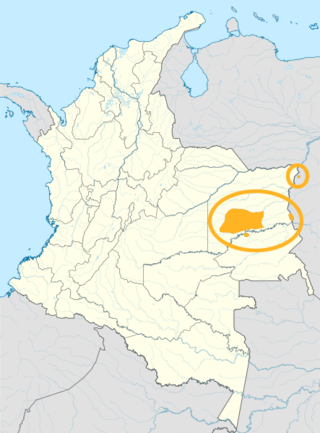Piapoco language
| Piapoco | |
|---|---|
| Cháse | |
| Native to | Colombia, Venezuela |
Native speakers | 6,400 (2001–2007)[1] |
Arawakan
| |
| Language codes | |
| ISO 639-3 | pio |
| Glottolog | piap1246 Piapocopona1251 Ponares – undemonstrated |
| ELP | Piapoco |
 | |
Piapoco is an Arawakan language of Colombia and Venezuela.
A "Ponares" language is inferred from surnames, and may have been Piapoco or Achagua.
History
[edit]Piapoco is a branch of the Arawak language, which also includes Achagua and Tariana.[2] Piapoco is considered a Northern Arawak language.[3] There are only about 3,000 Piapoco speakers left today. These people live in the Meta, Vichada, and Guaviare rivers in Colombia[4] Piapoco speakers also reside in Venezuela.[5] It is an endangered language.[5]
Geography/Background
[edit]The Piapocos come from the larger tribe, the Piaroa, who are indigenous to the Amazon rain forest.[6] The Piapoco people originally lived in the midsection of Rio Guaviare, later moving in the 18th century to avoid settlers, missionaries, and others.[7]
Grammar
[edit]A Piapoco-Spanish dictionary containing 2,500 words was written by Deloris Klumpp, in which botanical identification of plants were captured, although not all.[3] The Piapoco language follows the following grammatical rules: plural suffix -nai used for animates only, derivational suffixes masculine -iri, feminine -tua, suffix -mi 'late, defunct,' nominalizing -si, declarative mood marker -ka.[3] Piapoco is unique in that it seems to be a nominative-accusative language.[3] There are eighteen segmental phonemes, fourteen consonant and four vowels in the Piapoco language.[8]
Phonology
[edit]Consonants
[edit]| Labial | Dental | Alveolar | Palatal | Velar | Glottal | ||
|---|---|---|---|---|---|---|---|
| Nasal | m | n | |||||
| Stop | voiceless | p | t | k | |||
| voiced | b | d | |||||
| Affricate | ts | ||||||
| Fricative | s̪ ~ θ | h | |||||
| Trill | r | ||||||
| Approximant | w | l | j | ||||
- /s̪/ can be pronounced as [θ] among speakers who have had less contact with Spanish speakers.
- /k/ can be palatalized as [kʲ] when after /i/, before another vowel.
- /ts/ can be pronounced as [tʃ] in free variation among different speakers.
- /w/ is pronounced as [β] when preceding front vowels.
Vowels
[edit]| Front | Back | |
|---|---|---|
| High | i | u |
| Low | e | a |
Vowels can be nasalized [ã] when occurring before nasal consonants.[9]
Bilingualism
[edit]The word Piapoco is a Spanish nickname in reference to the toucan.[4] Most Piapoco also speak Spanish.[7] Speakers who have had less contact with Spanish speakers more often pronounce the phoneme "s" as a voiceless interdental fricative.[8] Younger speakers of the Piapoco language tend to eliminate the "h" more than older speakers due to their contact with the Spanish language.[8]
When a large portion of people come in contact with another language and are competent in it, their language gradually becomes more like the other.[10] This allows for a gradual convergence, where grammar and semantics of one language begin to replicate the other.[10]
References
[edit]- ^ Piapoco at Ethnologue (18th ed., 2015) (subscription required)
- ^ Seifart, F (2012). "Causative Marking in Resígaro (Arawakan): A Descriptive and Comparative Perspective". International Journal of American Linguistics. 78 (3): 369–384. doi:10.1086/665917. S2CID 144865690.
- ^ a b c d Aikhenvald, Alexandra Y. (1 January 1998). "Review of Vocabulario Piapoco-Español, ; Bosquejo del Macuna: Aspectos de la cultura material de los macunas--Fonología; Gramática, , , ; Gramática Pedagógica del Cuiba-Wámonae: Lengua indígena de la familia lingüística guahiba de los llanos orientales". International Journal of American Linguistics. 64 (2): 168–173. doi:10.1086/466355. JSTOR 1265983.
- ^ a b Klumpp, James; Burquest, Donald A. (1 January 1983). "Relative Clauses in Piapoco". International Journal of American Linguistics. 49 (4): 388–399. doi:10.1086/465801. JSTOR 1265211. S2CID 144582996.
- ^ a b "Did you know Piapoco is threatened?". Endangered Languages. Archived from the original on 2017-10-08. Retrieved 2017-04-30.
- ^ Piapoco Indians. (n.d.). Retrieved March 09, 2017, from http://www.indian-cultures.com/cultures/piapoco-indians/ Archived 2019-02-26 at the Wayback Machine
- ^ a b Flowers, N. M. (n.d.). Piapoco. Retrieved March 09, 2017, from http://www.everyculture.com/South-America/Piapoco.html
- ^ a b c Klumpp, D. (1990). Piapoco Grammar. 1-136. Retrieved March 9, 2017, from https://www.sil.org/resources/archives/18810 Archived 2017-11-15 at the Wayback Machine.
- ^ Klumpp, Deloris A.; Hollenbach, Barbara E. (2019). A Grammar of Piapoco. SIL International.
- ^ a b Aikhenvald, Alexandra Y. (1 January 2003). "Mechanisms of Change in Areal Diffusion: New Morphology and Language Contact". Journal of Linguistics. 39 (1): 1–29. doi:10.1017/s0022226702001937. JSTOR 4176787.
- Klumpp, Deloris A. (2019). Hollenbach, Barbara E. (ed.). A Grammar of Piapoco. SIL eBook 71. SIL International.
